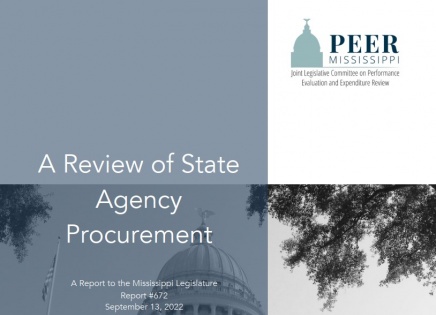Below is a press release from the Mississippi Joint Legislative PEER Committee:
The PEER Committee recently released its report titled A Review of State Agency Procurement.
Some of the Committee’s major findings and recommendations include:
– Competitive sealed bidding is the preferred method for state procurement. Request for proposals (RFPs) and request for qualifications (RFQs) are alternative methods of state procurement. The procurement process for RFPs and RFQs is dictated by the best practices found in MISS. CODE ANN. Section 31-7-401 (1972) et seq. Statute dictates that the procuring agency must complete all aspects of the process.
– The statutory nature of the best practices has been problematic because the Public Procurement Review Board (PPRB) staff does not have discretion to recommend approval of procurements with best practices violations. For example, in instances of some blind scoring violations, the procurement is often not recommended for approval even if, in spite of the violations, the procurement would have been competitive.
– Between January 2018 and June 2022, 23 of the 32 procurements that were not approved were due to best practices violations. The most common types of best practices violations were blind scoring violations, violations against public notice or publication of documents, and failure to obtain a petition for relief from competitive sealed bidding from PPRB.
– PEER estimated the cost of procurements that were not approved due to best practices violations to be $271,188. Additionally, DFA identified at least nine out of 22 instances in
which procurements not approved due to best practices violations turned into emergency procurements.
– DFA should implement its midpoint review process and the secondary evaluation committee as means of corrective action for policy issues with the statutory procurement best practices (e.g., blind scoring violations). DFA should evaluate the success of the midpoint review, and if successful, return to the Legislature during the 2024 Regular Legislative Session to update the PEER Committee and the Senate and House Accountability, Efficiency, and Transparency Chairmen on its progress.
– DFA should build a series of information quick reference guides and make them easily accessible on its website which detail: a step-by-step guide to the RFP/RFQ process, important RFP/RFQ requirements, and a general Frequently Asked Questions section for the RFP/RFQ process.
Should you have questions about the report, please contact James F. (Ted) Booth, PEER Executive Director, at 601-359-1226.
You can read the full report here: https://www.peer.


